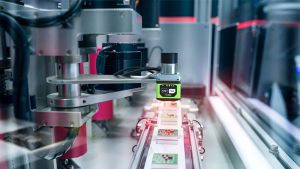In the realm of industrial automation, choosing the right vision system is crucial for optimising production efficiency and quality control. Two primary types of vision systems dominate the market: fixed industrial scanners and smart sensors/cameras. Each has unique features and applications, making them suitable for different industrial needs. This article explores the differences between these two types of systems, with a particular focus on Zebra’s FS and VS series.

Fixed Industrial Scanners
Fixed industrial scanners are highly specialised devices designed for specific tasks such as barcode reading, object tracking, and high-speed sorting. These scanners are typically mounted in fixed positions along production lines and are optimised for high-speed and high-volume applications.
Key Features of Fixed Industrial Scanners:
→ High-Speed Performance: Fixed industrial scanners are engineered to read barcodes and capture data at extremely high speeds, often exceeding hundreds of scans per second. This makes them ideal for environments where products move quickly, such as conveyor belts and packaging lines.
→ Precision and Accuracy: These scanners are designed to deliver precise and accurate readings, ensuring that every barcode or label is correctly identified and processed. This accuracy is crucial for maintaining inventory control and ensuring that products are correctly routed and identified.
→ Robust Construction: Fixed industrial scanners are built to withstand harsh industrial environments. They are typically encased in rugged housings that protect them from dust, moisture, and physical impact.

Zebra FS Series:
Zebra’s FS series exemplifies the capabilities of fixed industrial scanners. The FS10 and FS20 models are designed for high-speed, high-accuracy barcode scanning. The FS10 offers entry-level fixed scanning capabilities, while the FS20 provides enhanced connectivity options, including Ethernet and serial ports, making it suitable for more complex integration into existing systems.
Smart Sensors and Cameras
Smart sensors and cameras, on the other hand, offer a broader range of functionalities beyond simple barcode scanning. These devices integrate advanced image processing and machine vision capabilities, making them versatile tools for various applications such as inspection, measurement, and robotic guidance.
Key Features of Smart Sensors and Cameras:
→ Advanced Image Processing: Smart sensors and cameras are equipped with powerful processors that enable complex image analysis. They can perform tasks such as pattern recognition, object detection, and defect identification.
→ Flexibility and Adaptability: Unlike fixed scanners, smart sensors and cameras can be programmed to handle multiple tasks and adapt to different products and production lines. This flexibility makes them ideal for environments where products or requirements frequently change.
→ Integration with Automation Systems: These devices often come with software that allows seamless integration with broader automation and control systems. They can communicate with PLCs (Programmable Logic Controllers) and other industrial controllers, providing real-time data and insights.
Zebra VS Series:
The Zebra VS series, including models like the VS20 and VS40, showcases the versatility of smart sensors and cameras. The VS20 is designed for integration with PLCs and offers advanced image processing capabilities. The VS40 goes a step further, providing higher resolution and more powerful processing for even more demanding applications. Both models support a range of connectivity options and can be easily integrated into existing automation systems.
Comparing Zebra FS and VS Series
Since the Zebra FS and VS series look alike and share the same hardware, it is essential to consider the specific needs of your application.
Speed and Volume:
→ FS Series: The FS series is optimised for high-speed, high-volume barcode scanning. If your primary requirement is to read barcodes quickly and accurately in a high-throughput environment, the FS series is likely the better choice.
→ VS Series: While the VS series can handle barcode scanning, its strength lies in its ability to perform complex image analysis tasks. It is better suited for applications that require detailed inspection, measurement, or multiple vision tasks.
Flexibility:
→ FS Series: Fixed industrial scanners are typically more rigid in their application. They are designed for specific tasks and do not offer the same level of flexibility as smart sensors/cameras.
→ VS Series: The VS series offers greater flexibility and can be reprogrammed or adjusted to handle different tasks. This makes them ideal for environments where production lines or inspection criteria may change frequently.
Integration and Connectivity:
→ FS Series: The FS20 model, in particular, offers robust connectivity options, making it easy to integrate with existing systems. However, its primary function remains barcode scanning.
→ VS Series: The VS series excels in integration capabilities, with models like the VS40 offering advanced connectivity and powerful software for seamless integration with automation systems. They provide more comprehensive data and can interact with other devices and systems more effectively.
Making Your Decision
Choosing between fixed industrial scanners and smart sensors/cameras depends largely on the specific requirements of your application. Fixed industrial scanners like those in the Zebra FS series are ideal for high-speed, high-accuracy barcode scanning in fixed positions along production lines. In contrast, smart sensors/cameras, exemplified by the Zebra VS series, offer greater flexibility and advanced image processing capabilities, making them suitable for a wider range of tasks, including inspection and measurement.
Understanding the strengths and limitations of each system will help you make an informed decision, ensuring that your vision system meets your production needs and enhances overall efficiency. If you would like to explore vision solutions, get in touch with JM Vistec System. Our consultants will take the time to understand your needs and recommend the most appropriate products.






